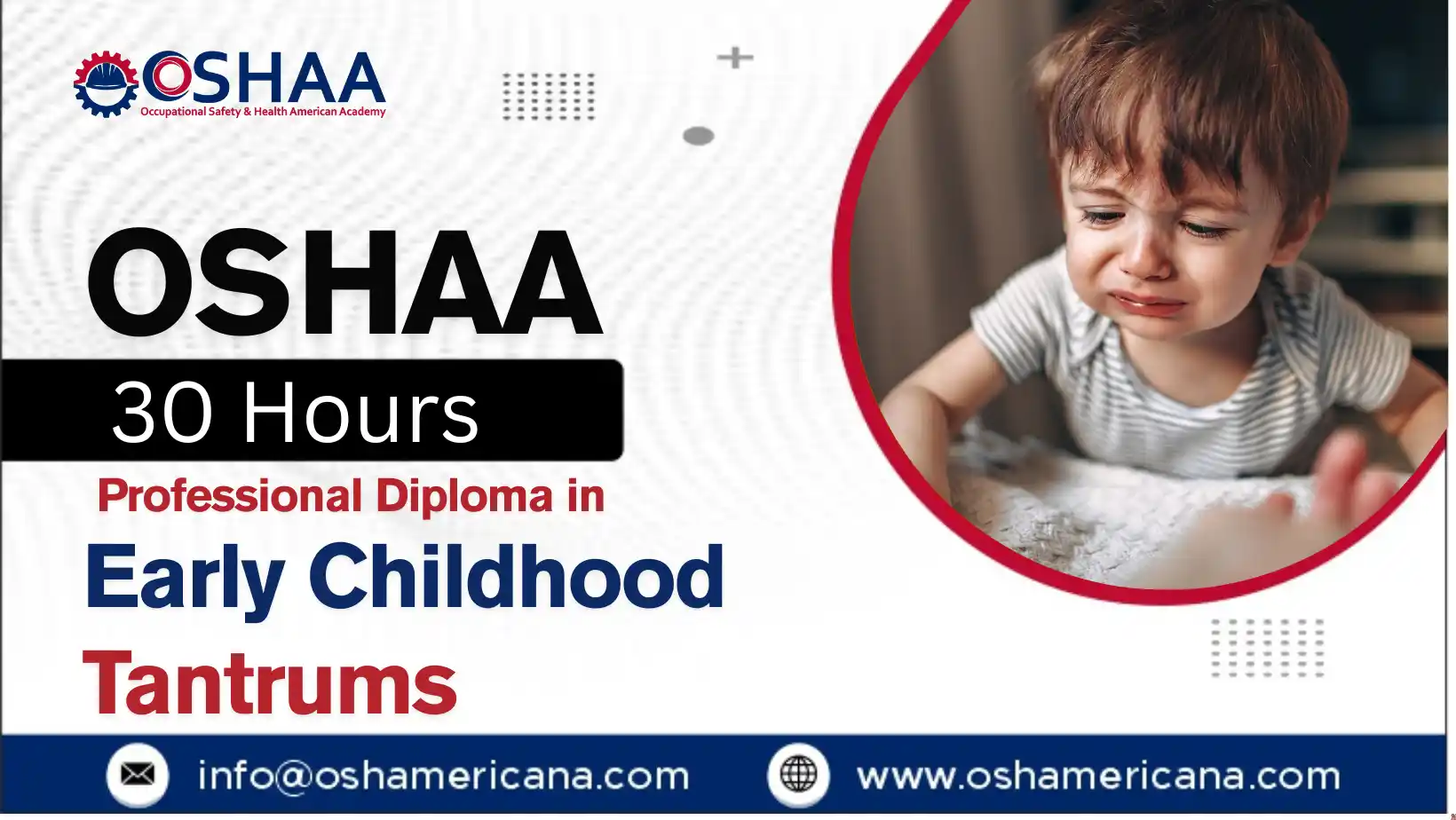Early childhood is a critical period in a child’s development, marked by rapid emotional, cognitive, and behavioural changes. One of the most common challenges faced by educators, parents, and caregivers during this stage is managing tantrums. The OSHAA 30-Hours Professional Diploma in Early Childhood Tantrums is a specialised qualification designed to provide in-depth understanding and effective strategies for managing tantrums in a professional, supportive, and developmentally appropriate way.
This course offers a structured and comprehensive exploration of early childhood tantrums, delving into their root causes, developmental significance, and effective intervention strategies. Participants will explore the psychology behind tantrum behaviours, the role of emotional development, and practical tools for guiding young children through moments of distress.
The OSHAA 30-Hours Professional Diploma in Early Childhood Tantrums is an essential qualification for anyone committed to understanding and supporting young children during their most formative years. By combining expert insight with practical strategies, the course empowers professionals to create nurturing, responsive environments where children feel understood, supported, and guided through their emotional development.
OSHAA 30-Hours Professional Diploma in Early Childhood Tantrums
Study Units
Learning Outcomes
Introduction to Early Childhood Behaviour and Tantrum Development (3 Hours)
- Understand typical behavioural patterns in early childhood
- Recognise the developmental milestones associated with emotional expression
- Identify the characteristics and types of tantrums
- Explain the difference between age-appropriate behaviour and behavioural concerns
Emotional and Cognitive Foundations of Tantrums (4 Hours)
- Understand how emotional and cognitive development influence tantrum behaviour
- Explore the role of frustration, unmet needs, and emotional dysregulation
- Identify how brain development impacts self-control in young children
- Analyse behavioural responses in the context of early childhood emotions
Identifying Triggers and Underlying Causes of Tantrums (3 Hours)
- Recognise common internal and external triggers for tantrums
- Assess how environment, routine, and individual needs contribute to behaviour
- Explore the link between sensory processing and tantrum responses
- Use observation techniques to identify patterns and triggers
Responsive Strategies for Tantrum Management (4 Hours)
- Apply immediate and safe responses to de-escalate tantrums
- Implement positive discipline techniques suitable for early years
- Use calming and redirection strategies effectively
- Tailor intervention methods to the child’s individual temperament and needs
Building Emotional Regulation Skills in Young Children (5 Hours)
- Support the development of self-awareness and emotional vocabulary
- Teach simple coping strategies and calming techniques
- Encourage problem-solving and decision-making in a child-centred way
- Reinforce emotional regulation through modelling and positive reinforcement
Creating Supportive Environments and Predictable Routines (4 Hours)
- Design learning environments that promote emotional security
- Understand the role of consistency and structure in behaviour regulation
- Create daily routines that reduce stress and behavioural outbursts
- Modify environments to accommodate children with additional needs
The Role of Adult Reactions and Behaviour Modelling (5 Hours)
- Reflect on how adult behaviour influences child responses
- Model appropriate emotional responses and conflict resolution
- Maintain composure and consistency during challenging situations
- Build trusting relationships through positive interactions and empathy
Effective Communication Techniques with Children During Tantrums (2 Hours)
- Use age-appropriate language to validate emotions and set boundaries
- Practise active listening to understand a child’s perspective
- Encourage verbal expression over physical outbursts
- Support children in identifying and naming their emotions
Course Benefits: OSHAA 30-Hours Professional Diploma in Early Childhood Tantrums
- Develops specialist knowledge in understanding and managing early childhood tantrums
- Equips professionals with evidence-based strategies for supporting emotional regulation in young children
- Enhances the ability to create calm, responsive, and developmentally appropriate environments
- Strengthens communication skills with children during emotionally challenging moments
- Promotes positive behaviour management techniques aligned with early years best practices
- Improves relationships with children and families through consistent, empathetic approaches
- Reduces stress and burnout for practitioners by providing practical, effective intervention tools
- Supports compliance with safeguarding and wellbeing standards in early years settings
- Contributes to professional development and strengthens qualifications in early childhood education and care
- Opens progression pathways into child psychology, special education, behaviour support, and parental guidance roles
The OSHAA 30-Hours Professional Diploma in Early Childhood Tantrums is designed for individuals who work directly with young children and seek to improve their understanding and management of challenging behaviours. It is particularly suited for:
- Early years practitioners, nursery staff, and preschool educators
- Primary school teachers and teaching assistants
- Childminders, nannies, and family day care providers
- Special educational needs (SEN) professionals and behaviour support staff
- Social workers and family support officers
- Child psychologists, counsellors, and early intervention specialists
- Parenting coaches and family advisors
- Professionals working in community or voluntary settings with young children
- Students and career changers preparing for roles in early childhood education or care
This course is ideal for both experienced practitioners and those entering the field who want to build the confidence, knowledge, and practical skills needed to support young children through emotional and behavioural challenges.







